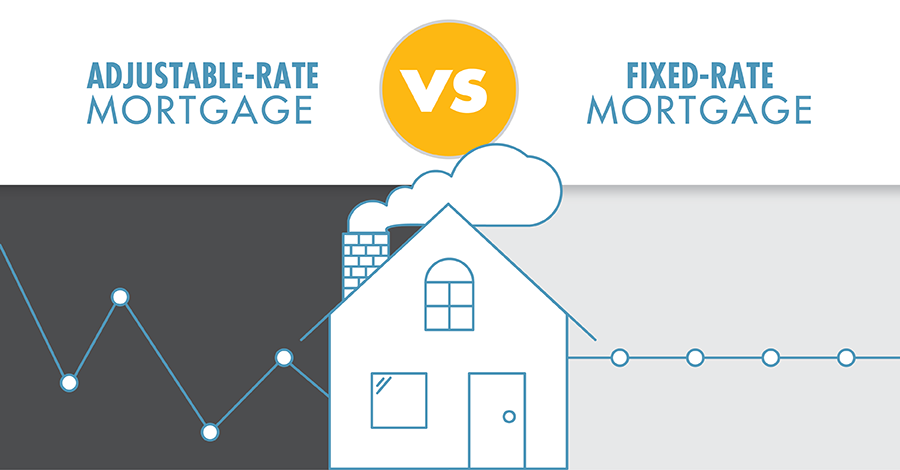The Art of Choosing: Fixed Rate Mortgages vs. Adjustable Rate Mortgages
The world of mortgages can often feel like a labyrinth of options, especially when faced with the decision between two prominent choices: fixed rate mortgages and adjustable rate mortgages. Both avenues offer distinct advantages and come with their own set of risks. In this article, we embark on an exploration of the nuances that set these two types of mortgages apart, aiding you in making a well-informed choice tailored to your financial aspirations.

Fixed Rate Mortgages: A Stalwart of Stability
The hallmark of a fixed rate mortgage lies in its steadfast predictability. With this mortgage type, your monthly payment remains constant throughout the entirety of the loan term. This means that you’re shielded from the fluctuations of interest rates, providing a sense of financial security that resonates with many homeowners.
Advantages of Fixed Rate Mortgages:
- Predictability: Knowing your exact monthly payment allows for meticulous budgeting and financial planning.
- Protection from Rate Changes: Your interest rate remains unaltered even if market interest rates surge.
Considerations:
- Higher Initial Rates: Fixed rate mortgages typically come with slightly higher initial interest rates compared to adjustable rate mortgages.
- Missed Savings in Falling Rates: If market interest rates drop, you might miss out on potential savings.
Adjustable Rate Mortgages: The Realm of Opportunity
Adjustable rate mortgages, on the other hand, offer an initial interest rate lower than that of their fixed rate counterparts. However, after a predetermined period (usually ranging from a few years to a decade), the interest rate adjusts based on a market index. This can lead to fluctuations in your monthly payment, introducing an element of uncertainty into your financial landscape.
Advantages of Adjustable Rate Mortgages:
- Lower Initial Rates: The lower starting interest rate results in reduced initial monthly payments.
- Possible Savings in Stable Rates: If market interest rates remain stable or decrease, you might enjoy savings over the life of the loan.
Considerations:
- Uncertain Future Payments: The fluctuating nature of interest rates can lead to unpredictable changes in monthly payments.
- Risk of Rising Rates: A surge in market interest rates can significantly increase your monthly payment.
The Art of Choosing
Selecting the optimal mortgage type hinges on your financial circumstances and appetite for stability. If you value predictability and wish to insulate yourself from interest rate volatility, a fixed rate mortgage might suit you. On the other hand, if you possess strong financial standing and are prepared to navigate potential market fluctuations, an adjustable rate mortgage could be the path to explore.
In either case, thorough research, consultation with financial experts, and meticulous consideration should underpin your decision-making process. The journey of choosing between fixed rate and adjustable rate mortgages is a voyage of customization, tailoring your choice to align with your financial present and future.

The Debate: Fixed Rate Mortgages vs. Adjustable Rate Mortgages
When it comes to choosing a home loan, many individuals find themselves facing a challenging decision between two main options: fixed rate mortgages and adjustable rate mortgages. Both options have their own advantages and risks, and in this article, we will discuss in detail the differences between these two types of loans.
Fixed Rate Mortgages
With a fixed rate mortgage, the interest rate you pay each month remains unchanged throughout the loan term. This means you know exactly how much you’ll be paying each month and can budget more easily. Fixed rate mortgages are often suitable for those who want to maintain stability in their family budgets and avoid being affected by fluctuations in the interest rate market.
Adjustable Rate Mortgages
Adjustable rate mortgages usually start with a lower interest rate than fixed rate mortgages, but after a certain period (typically ranging from a few years to a decade), the interest rate adjusts based on a market index. This can lead to an increase or decrease in the amount you have to pay each month. Adjustable rate mortgages are generally suitable for individuals with strong financial capabilities who are willing to accept the risks that can come from fluctuations in the interest rate market.
Advantages and Risks of Each Loan Type
Fixed Rate Mortgages:
Advantages:
- Ease of financial forecasting, with no significant changes in monthly payments.
- Protection against rising interest rates and the volatility of the interest rate market.
Risks:
- Usually come with a higher initial interest rate compared to adjustable rate mortgages.
- You might end up paying more if the interest rate market decreases.
Adjustable Rate Mortgages:
Advantages:
- Lower initial interest rates can lead to lower initial monthly payments.
- Potential to save money if the interest rate market remains stable.
Risks:
- Uncertainty in financial forecasting due to potential fluctuations in monthly payments.
- Vulnerability to rising market interest rates, resulting in increased payments.
Choosing the Right Option for You
Deciding between a fixed rate mortgage and an adjustable rate mortgage depends on your financial situation and stability. If you prefer predictability and stability, a fixed rate mortgage might be suitable. If you have strong financial capabilities and are prepared to face the risks that can arise from interest rate fluctuations, an adjustable rate mortgage might be a better option. Most importantly, conduct thorough research, consult with financial experts, and carefully consider your decision before choosing the loan type that best fits your needs.
